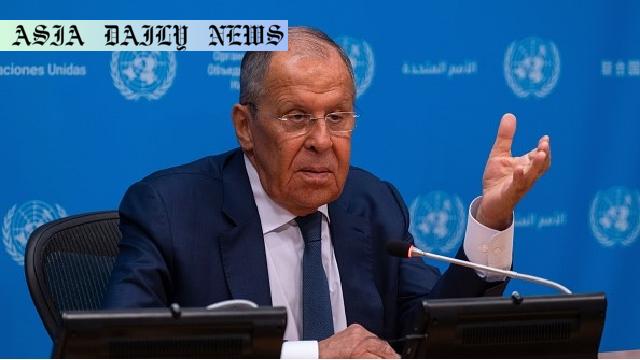Peace Memorandum: Russia ready to brief Ukraine on a peace memorandum next Monday in Turkey, focusing on overcoming crisis causes.

Introduction: Russia’s Prepared Peace Memorandum
On Wednesday, Russian Foreign Minister Sergey Lavrov announced Russia’s preparedness to present a peace memorandum aimed at resolving the ongoing crisis with Ukraine. The memorandum is set to be introduced to Ukrainian officials during a meeting scheduled for next Monday in Istanbul, Turkey. Lavrov emphasized the document’s comprehensive detailing of Russia’s perspective on addressing the foundational causes of the conflict and fostering long-term peace in the region.
Background: Previous Efforts and Context
Earlier this year, senior officials from both Russia and Ukraine convened in Istanbul to discuss a potential ceasefire. Unfortunately, those talks failed to yield substantive progress, leaving both parties at an impasse. The broader geopolitical situation remains tense, with diplomatic efforts fluctuating between stagnation and measured hopefulness. Lavrov’s announcement came on the heels of a phone discussion between Russian President Vladimir Putin and former U.S. President Donald Trump, where Putin expressed a willingness to cooperate with Ukraine on pathways toward peace. This memorandum is seen as a tangible step in that direction, signaling Russia’s intent to seek a negotiated solution.
The Content and Purpose of the Memorandum
Lavrov elaborated that the memorandum provides Russia’s perspective on the crisis’s core issues, addressing what Moscow perceives as the root causes. Its goal is to establish a roadmap that both nations can use to work toward conflict de-escalation and eventual reconciliation. While specific details of the document remain undisclosed, it is expected to touch on territorial integrity, security guarantees, and economic rebuilding measures. Lavrov unequivocally stated these elements are non-negotiable prerequisites for dependable peace.
The Delegations and Leaders
The upcoming talks in Turkey will see experienced delegations from both sides. Russia’s presidential aide Vladimir Medinsky, who has played a significant role in previous negotiations, will head the Russian side. On the Ukrainian side, Defence Minister Rustem Umerov will lead the delegation. Both leaders have engaged in prior conversations to determine the agenda, with mutual acknowledgment of the importance of finding common ground.
Significance and Global Implications
The peace memorandum represents more than just diplomatic relations between Russia and Ukraine; it carries significant implications for global stability. The international community has closely monitored these developments, with nations like the United States and the European Union urging both sides to prioritize peaceful solutions. Furthermore, a successfully brokered peace could have widespread ramifications, including economic recovery for the affected regions and reduced tensions in broader geopolitical alliances.
Challenges Ahead
While the announcement of the memorandum is a promising sign, substantial challenges lie ahead. Trust deficits between the two nations remain high, with historical grievances and recent hostilities complicating negotiations. Moreover, the international actors with vested interests in the region may influence the outcome of the talks, either positively or negatively. Both parties will need to demonstrate a commitment to fair and transparent dialogue to achieve meaningful results.
Conclusion: A Step Toward Peace
As the world eagerly awaits the unfolding of these discussions, the potential for a diplomatic resolution offers a glimmer of hope. The peace memorandum serves as a critical instrument in facilitating dialogue and addressing the deep-rooted issues that have perpetuated the crisis. Both nations have an opportunity to demonstrate their dedication to peace, not only for their citizens but for the stability of the entire international community.
Commentary
The Importance of Diplomacy in Conflict Resolution
The announcement of a peace memorandum by Russia, as shared by Foreign Minister Sergey Lavrov, underscores the vital role diplomacy plays in conflict resolution. In an era where geopolitics often leans toward aggressive postures, any initiative aiming to facilitate dialogue should be welcomed. By presenting a detailed roadmap aimed at resolving the Ukrainian crisis, Russia has set a foundation for constructive discussions. However, the success of such efforts hinges on mutual trust and a shared desire for stability.
Opportunities for Mediation and Global Stability
The scheduled talks in Istanbul present an opportunity for both Russia and Ukraine to engage in open and substantive discussions about the future of their region. This is not just about resolving a bilateral issue; the outcomes of these talks will resonate globally. A resolution could set a precedent for how nations can come together to address complex conflicts. Additionally, with stakeholders like the United States and European Union keenly watching, this memorandum could symbolize a collective move toward global peace.
The Road Ahead: Challenges and Hopes
Despite these promising developments, it is crucial to acknowledge the obstacles that lie ahead. The deep-seated mistrust between Russia and Ukraine is not easily overcome. Both sides will need to demonstrate compromise and goodwill to ensure these discussions reach a productive outcome. The role of external mediators may also be pivotal in facilitating balanced conversations. Ultimately, the hope is that this memorandum becomes the cornerstone of a long-lasting peace strategy, benefitting not just the involved nations but the world at large.


